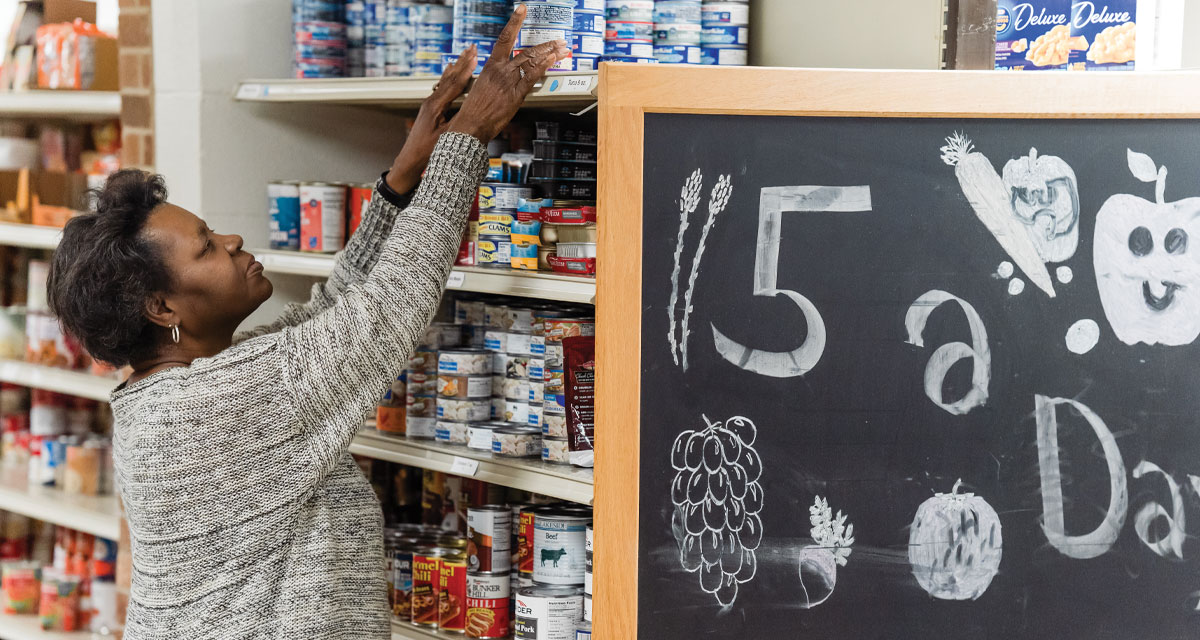photos by JODIE BRIM CREATIVE
“All things become possible in a loving community” – Rev. Ron E. Rice
From heartfelt stories of hope to the smiling faces of volunteers who are personally grateful for the opportunity to share their faith and love, every element of Crisis Control Ministry in Winston-Salem shines a light like no other.
Poverty Knows No Season
As the largest non-profit provider of emergency assistance in the county, Crisis Control Ministry serves neighbors in both Forsyth and Stokes counties, throughout every season of every year.
Founding director, the Reverend Ron E. Rice, believed the local religious community should help neighbors with the basics of life – shelter, food, medicine – in addition to spiritual guidance. That spirit of offering grace to others lives on as the mantra of Crisis Control Ministry, with the humble admission that everyone fails at times, and it’s God’s grace that sees us through.

First organized in 1973, the ministry was born from the realization that local congregations alone weren’t able to meet the needs of those individuals who were experiencing a crisis, and other agencies were restricted by eligibility criteria. The ministry officially opened on April 4th of that year – a mission of First Baptist Church – housed in a brick structure at 930 Patterson Avenue. Rev. Rice was the first executive director, and his vision was one of ministering with people, not simply to people. The ministry’s current location on Tenth Street opened in 1985, right behind its original building on Patterson Avenue.
“I think it was significant that when the ministry felt the need to build a more adequate building, there was little thought given to moving away from the old locality,” said Rice, of the new location. “The new building was erected in the same block, in an area that has somehow come to be sacred ground. It has been sanctified with the sweat, tears and prayers of a lot of God’s people.”
The ministry’s ties run deep to the past – where Rev. Rice and early volunteers sowed the seeds of love and grace – to the bustling present, where Rice’s family is still active in the mission, and his spirit looms large over its work – and to the future, where the generosity of neighbors will continue to nourish others when they need it most. The ministry aids those in crisis with financial assistance for housing and utilities, food and medicine. More than 16,000 people were served in 2022 alone.

The Daily Mission
As no family situation is the same, no day within the Crisis Control Ministry walls is the same. Margaret Elliott, now in her 24th year as Executive Director, shares what sets the mission apart.
“The beauty is we listen to individuals – then and there – when they call or come in,” she says. “They leave here knowing they have been heard, and it’s our philosophy to get them through the current crisis at hand.”
Clients, who are individuals or families, sometimes find themselves in situations that don’t fit neatly into government guidelines. Scenarios that can contribute to family crises are job loss, illness of a parent or child, or a serious accident, and for those who find themselves regularly living “on the edge” financially, a crisis can be just one event away.
Approximately 300 volunteers are the heart and soul of Crisis Control Ministry. Interviewers, 18 years of age and older, are trained to conduct interviews with neighbors who call, are referred by local congregations or other agencies, or who simply walk in for assistance. Dedicated long-time volunteer Paula Parks has been here since the beginning, and calls in-person interviews a real blessing for both sides.
“In person, you really get to hear their story,” she explains. “It’s easier to build a trusting rapport, and you can see in their eyes what they are truly facing.”
Sometimes the real story isn’t there on paper, but in the human interaction of that in-person encounter. Being able to grant help out of grace, rather than proof it has been earned, is what sets this ministry apart.
Many volunteer opportunities are available. Corporate groups, school groups and groups from religious congregations often work in the food pantry stocking shelves. The Crisis Control Ministry client-choice food pantry is designed as a grocery store, so families can choose their own individual items, based on personal preference or health restrictions. Families – of any size – receive two weeks worth of food at one time, including meats, breads and fresh produce provided by local grocery stores, and even birthday cakes for special occasions – a luxury for a family in need. Fresh flowers are often available, thanks to local retailer Trader Joe’s. There’s no denying the smile of someone who realizes they can surprise a loved one with a bouquet.
In 1987, Crisis Control Ministry also opened the first state-licensed free pharmacy – a major addition to their services. The fully staffed pharmacy is especially important to those with chronic illnesses – most often diabetes or high blood pressure. Access to free medicine affords patients the opportunity to spend more of their resources on healthier food options.
The ministry’s current staff of 18 also embodies the founders’ original unifying principles of love, stewardship, listening, grace, truth, collaboration, transformation and the quest for better lives – and you’ll find those profound words stenciled on the walls of the building’s welcoming lobby. Creative works by local artists hang on walls throughout the offices, reflecting an unmistakable sense of community.

Awareness & Advocacy
“Ties that bind us in loving relationships do make a world of difference.” Rev. Ron E. Rice
The ministry’s largest area of recent growth has been in advocacy and awareness, with many eye-opening experiences for groups and individuals to learn about the struggles neighbors face. “Poverty Simulations” – presented by volunteers with a minimum of 40 participants – transports you from your own daily life to that of a family living near poverty level. In sessions of four, 15-minute “weeks,” you must meet your family’s daily obligations of work, school, paying bills and buying groceries with limited resources. Another enlightening workshop is the “Living on the Edge” program, a 75-90 minute interactive presentation ideal for small groups. Both activities show the reality and fragility of living in crisis. Thirdly, a four-hour seminar called “Bridges out of Poverty,” based on the book of the same name, guides participants through the history of poverty and considers ways we can improve our communities.
There are many simple ways to support Crisis Control Ministry, including dining out to support their signature awareness event – the 33rd annual Hope du Jour on Tuesday, May 2, 2023. A list of participating restaurants that give 10% of their proceeds throughout that day – including dine-in and take-out – can be found at hopedujour.org. For information on the ministry’s 50th Year Celebration and Worship Service on April 3, 2023, visit crisiscontrol.org/50years. The community worship and music service at First Baptist Church on Fifth will feature keynote speaker Bishop Michael B. Curry, the Presiding Bishop of the Episcopal Church (and a former Crisis Control Ministry board chairman). Later, on August 26, 2023, all are invited to a 50th anniversary Community Concert and Celebration, with bands, food, fun and an opportunity to continue spreading the seeds of awareness and grace – from neighbor to neighbor.
Rev. Rice’s soulful guidance, even after his passing in 1990, continues to bless the downtown ministry that bears his name at its front door.
Crisis Control Ministry is located at 200 East Tenth Street in Winston-Salem. Hours are Monday through Friday: 9:00 a.m. – noon, and 1:00 p.m. – 4:00 p.m. Reach them at 336.724.7453, and online at Crisiscontrol.org. The satellite Kernersville location is at 431 W Bodenhamer St, 336.996.5401. Hours are Monday through Friday: 9:00 a.m. to noon, with additional hours Tuesday and Thursday: 1:00 p.m. to 4:00 p.m.
Crisis Control Ministry – 2022 Statistics
Total People Served: 16,156
People Served with Food Assistance: 12,011
People Served with Pharmacy: 984
People Served with Utilities Assistance: 984
Volunteers: 1,334, total # of hours: 16,374



















